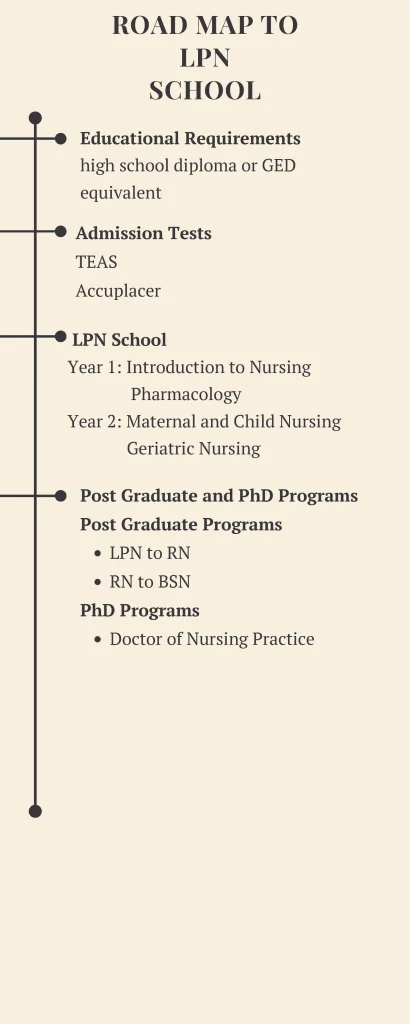The duration of LPN (Licensed Practical Nurse) school typically ranges from 12 to 18 months. This period includes both classroom instruction and clinical practice. Understanding how long is LPN school helps prospective students plan their educational journey and career path efficiently.
What is LPN School
LPN school is an educational program that trains students to become Licensed Practical Nurses. It combines classroom learning with hands-on clinical experience to equip students with the skills needed to provide basic nursing care. Graduates of LPN programs are prepared to work in various healthcare settings, including hospitals, nursing homes, and private residences.

LPN schools focus on teaching practical nursing skills, such as taking vital signs, administering medications, and providing patient care. The curriculum covers subjects like anatomy, physiology, pharmacology, and nutrition. By completing an LPN program, students gain the knowledge and experience necessary to pass the NCLEX-PN exam and obtain licensure as practical nurses.
How Long is LPN School
Year 1: Basic Courses
- Semester 1:
Introduction to Nursing
Anatomy and Physiology
Basic Nursing Skills
Health Assessment
- Semester 2:
Pharmacology
Medical-Surgical Nursing
Clinical Practicum I
Year 2: Advance Courses
- Semester 3:
Maternal and Child Nursing
Mental Health Nursing
Clinical Practicum II
- Semester 4:
Geriatric Nursing
Leadership and Management in Nursing
Clinical Practicum III
Preparation for NCLEX-PN Exam

How to Enter LPN School
Educational Requirements
High School Diploma or GED: Completion of secondary education is required.
Prerequisite Courses: Courses in biology, chemistry, and mathematics may be required.
CPR Certification: Basic life support certification is often required before starting clinical practice.
Entry Tests for LPN School
TEAS (Test of Essential Academic Skills): Many LPN programs require applicants to take the TEAS, which assesses basic academic skills in reading, math, science, and English.
Accuplacer: Some schools may use this placement test to assess readiness for college-level coursework.
Application Process for LPN School
- Research Programs:
Identify accredited LPN programs that match your career goals.
- Complete Application:
Fill out the application form online or in-person.
Submit high school transcripts and any required prerequisite coursework.
- Write Personal Statement:
Highlight your interest in nursing, career goals, and any relevant experience.
- Submit Letters of Recommendation:
Provide recommendations from teachers, employers, or healthcare professionals.
- Interview:
Some programs may require an interview as part of the selection process.
Financial Aids for LPN School
Grants:
Federal Pell Grant: Need-based grant for low-income students.
State Grants: Various state-funded grants available for residents.
Scholarships:
Nursing-Specific Scholarships: Offered by nursing organizations and schools.
Academic Scholarships: Merit-based scholarships for high-achieving students.
Loans:
Federal Student Loans: Subsidized and unsubsidized loans available.
Private Loans: Offered by banks and credit unions, often requiring a cosigner.
Work-Study Programs:
Provides part-time jobs for students with financial need, allowing them to earn money to help pay for education expenses.
Post Graduate and PhD Programs for LPN School
While LPN (Licensed Practical Nurse) programs themselves are entry-level nursing programs, LPNs can pursue advanced education to enhance their careers. Although there aren’t specific post-graduate or PhD programs exclusively for LPNs, they can transition into higher nursing degrees through various pathways:
1. LPN to RN (Registered Nurse) Programs:
Associate Degree in Nursing (ADN): Typically takes 2 years and prepares LPNs to become RNs.
Bachelor of Science in Nursing (BSN): An accelerated program that may take 2-3 years, depending on previous credits and experience.
2. RN to BSN Programs:
Designed for RNs who hold an ADN and want to earn a BSN. Usually takes 1-2 years.
3. Master’s Programs:
Master of Science in Nursing (MSN): For those holding a BSN, focusing on specialized areas like nurse practitioner, nurse educator, or nurse administrator. Takes about 2 years.
4. Doctoral Programs:
Doctor of Nursing Practice (DNP): Focuses on clinical practice and leadership. Takes about 3-4 years.
PhD in Nursing: Focuses on research and academic roles. Takes 3-5 years.
Top 10 LPN Schools

1.Practical Nursing Program at CUNY Bronx Community College
Location: Bronx, NY
Highlights: High NCLEX-PN pass rates, comprehensive clinical experience.
2.Practical Nursing Program at Central Louisiana Technical Community College
Location: Alexandria, LA
Highlights: Affordable tuition, excellent faculty support.
3.LPN Program at Northland Community & Technical College
Location: East Grand Forks, MN
Highlights: Flexible scheduling, strong job placement rates.
4.Practical Nursing Program at South Florida State College
Location: Avon Park, FL
Highlights: Small class sizes, extensive hands-on training.
5.Practical Nursing Program at Johnson County Community College
Location: Overland Park, KS
Highlights: High-quality curriculum, modern facilities.
6.LPN Program at Lake Area Technical College
Location: Watertown, SD
Highlights: High NCLEX-PN pass rates, supportive learning environment.
7.Practical Nursing Program at Riverside City College
Location: Riverside, CA
Highlights: Affordable tuition, strong clinical partnerships.
8.LPN Program at Eastern New Mexico University-Roswell
Location: Roswell, NM
Highlights: Diverse student population, excellent faculty.
9.Practical Nursing Program at Central Wyoming College
Location: Riverton, WY
Highlights: Personalized instruction, strong community connections.
10.LPN Program at Tennessee College of Applied Technology – Nashville
Location: Nashville, TN
Highlights: Hands-on training, high job placement rates.
These programs are known for their quality education, strong NCLEX-PN pass rates, and excellent student support services.
Factors Affecting the Length of LPN School
Program Type:
Full-Time vs. Part-Time: Full-time programs typically take 12-18 months to complete, while part-time programs may extend to 24 months or more, allowing students to balance other commitments.
Course Structure:
Accelerated Programs: Some schools offer accelerated programs that condense the curriculum into a shorter timeframe for students who can handle an intensive schedule.
Traditional Programs: These follow a standard pace, typically spanning over 12-18 months.
Clinical Hours Requirement:
State Regulations: Different states have varying requirements for the number of clinical hours needed for completion, affecting the overall length of the program.
School Policies: Some schools may require additional clinical practice beyond state minimums, extending the program duration.
Prerequisite Courses:
Completion of Prerequisites: Some programs require prerequisite courses (e.g., biology, anatomy) to be completed before admission, which can add to the total time if not already done.
Student’s Background:
Previous Education: Students with prior healthcare experience or coursework may receive credit for certain classes, potentially shortening the program length.
Learning Pace: Individual learning pace and ability to handle the course load can impact how quickly a student progresses through the program.
Institutional Factors:
Program Start Dates: Some schools offer multiple start dates throughout the year, while others may only have one or two, affecting how soon a student can begin.
Course Availability: Limited availability of required courses or clinical slots can delay progress if students have to wait for openings.
External Commitments:
Work and Family Obligations: Students balancing work or family responsibilities may choose part-time options, extending their time in the program.
Financial Considerations:
Ability to Pay: Financial constraints can impact the ability to enroll full-time or may cause delays if students need to work to afford tuition and fees.
Understanding these factors can help prospective students plan their educational journey more effectively, ensuring they choose the right program that fits their needs and circumstances.
Final Verdict
The length of LPN school can vary based on program type, course structure, clinical hour requirements, and individual circumstances. Prospective students should carefully consider these factors when planning their educational path to ensure they meet their career goals efficiently.
FAQs
1.How long is LPN school?
LPN programs typically take 12-18 months to complete, depending on whether the student attends full-time or part-time.
2.What are the prerequisites for LPN school?
Common prerequisites include a high school diploma or GED, CPR certification, and courses in biology and chemistry.
3.Do I need to take any entry tests for LPN school?
Many programs require entry tests like the TEAS (Test of Essential Academic Skills) or Accuplacer to assess academic readiness.
4.What financial aid options are available for LPN students?
Financial aid options include federal and state grants, nursing-specific scholarships, federal student loans, and work-study programs.
5.Can I transfer credits from previous coursework to an LPN program?
Some LPN programs accept transfer credits for relevant coursework, potentially shortening the duration of the program.
